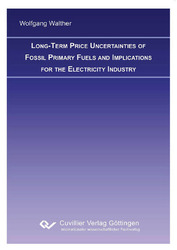| Departments | |
|---|---|
| Book Series (96) |
1381
|
| Nachhaltigkeit |
3
|
| Gesundheitswesen |
1
|
| Humanities |
2370
|
| Medienwissenschaften | 16 |
| Theology | 57 |
| Philosophy | 102 |
| Law | 424 |
| Economics | 851 |
| Social sciences | 418 |
| Sports science | 48 |
| Psychology | 233 |
| Educational science | 190 |
| History | 183 |
| Art | 111 |
| Cultural studies | 166 |
| Literary studies | 117 |
| Linguistics | 88 |
| Natural Sciences |
5408
|
| Engineering |
1795
|
| Common |
98
|
|
Leitlinien Unfallchirurgie
5. Auflage bestellen |
|
Advanced Search
Long-term Price Uncertainties of Fossil Primary Fuels and Implications for the Electricity Industry (English shop)
Wolfgang Walther (Author)Preview
Table of Contents, Datei (49 KB)
Extract, Datei (70 KB)
Energy has become an essential resource for today’s industrial societies. In particular, the availability of electricity is essential for the functioning of almost every sector of modern civilization, be it in industrial production, transportation, communication, housing, healthcare or any other sector conceivable. The effects of insufficiencies in the electricity supply system were shown dramatically through the blackouts in Europe and the U.S.A. in 2003.
Therefore, a timely and accurate planning of construction and deployment of power plant capacities is essential. Among all the decisions connected to the investment in a new power plant, the choice of fuel stands out. This decision will impact the profitability of a power plant until its very last day of operation, and, particularly for nuclear plants, even beyond. Unfortunately, future paths of fuel prices and CO2 emissions costs are far from certain and thus investment decisions are taken under considerable uncertainty.
Fossil fuel prices are determined by multiple key drivers, e.g. not only of geological, economic, technological and environmental but also of geopolitical and financial nature. Each key driver bears an element of uncertainty concerning its future development, usually with the degree of uncertainty increasing over time. Any deterministic forecast of future developments of fossil fuel prices, especially for such long periods as required for power plant investments, is highly prone to error on multiple dimensions
This study describes a stochastic modeling approach aimed at analyzing the impact of selected uncertainties in the formation of fossil fuel prices and at depicting the probability range of prices on a 5-year basis until 2050.
Worldwide production and transportation of fossil fuels is analyzed based on the final energy demand in four demand sectors and seven geographic regions. Developments in energy conversion efficiency rates, fuel production capacities, transportation routes and costs as well as CO2 emission costs are taken into account.
The ability to calculate a probability-weighted range of prices is gained by implementing the most relevant key drivers and their related uncertainties as stochastic input parameters in a linear optimization framework. Therefore, the model follows a successive two-step approach. In a first step, the expected development is calculated in an intertemporal deterministic optimization. In the second step, stochastic shocks are applied and restricted optimizations are carried out, taking into account notably the locked demand and other constraints from previous periods.
As result, the model delivers scenarios on global fuel production volumes and import prices for all geographic regions from 2005 to 2050 in 5-year-steps. It also can provide information on the development of fuel production capacities in each region.
Finally, the results for fossil fuel price corridors are applied to an existing model for investments in the German power generation market. It turns out that for 2010, a high share of coal-fired plants (nearly 60 percent) and a share of gas-fired combined cycle plants in the magnitude of 30 percent is to be expected. The rest is covered by lignite-fired plants. After 2010, the largest share of capacity investments is made in gas-fired combined cycle plants.
Comparing these stochastic results to those of a deterministic optimization run, it becomes obvious that the existence of uncertainties has an impact on optimal investment decisions. Uncertainty benefits technologies with low investment costs (in this case gas-fired power plants) even though this type of plants is exposed to higher fuel price risks.
| ISBN-13 (Printausgabe) | 3869551194 |
| ISBN-13 (Hard Copy) | 9783869551197 |
| ISBN-13 (eBook) | 9783736931190 |
| Language | English |
| Page Number | 258 |
| Edition | 1 Aufl. |
| Volume | 0 |
| Publication Place | Göttingen |
| Place of Dissertation | Universität Duisburg-Essen |
| Publication Date | 2009-10-13 |
| General Categorization | Dissertation |
| Departments |
Economics
|








